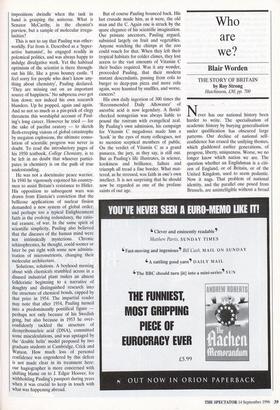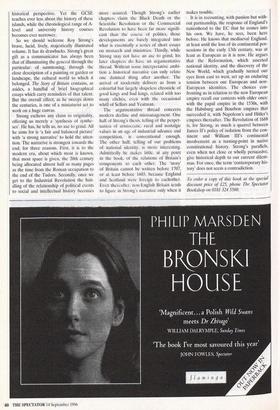Who are we?
Blair Worden
THE STORY OF BRITAIN by Roy Strong
Hutchinson, £30, pp. 700
Never has our national history been harder to write. The specialisation of academic history by burying generalisation under qualification has obscured large patterns. Our decline of national self- confidence has erased the unifying themes, which gladdened earlier generations, of progress, liberty, uniqueness. Worse, we no longer know which nation we are. The question whether an Englishman is a citi- zen of England, or of Britain, or of the United Kingdom, used to seem pedantic. Now it nags. That problem of national identity, and the parallel one posed from Brussels, are unintelligible without a broad
historical perspective. Yet the GCSE teaches ever less about the history of these islands, while the chronological range of A- level and university history courses becomes ever narrower.
So we should welcome Roy Strong's brave, lucid, lively, majestically illustrated volume. It has its drawbacks. Strong's great gift as a communicator has always been that of illuminating the general through the particular: of summoning, through the close description of a painting or garden or landscape, the cultural world to which it belonged. The Story of Britain contains, as asides, a handful of brief biographical essays which carry reminders of that talent. But the overall effect, as he sweeps down the centuries, is one of a miniaturist set to work on a huge canvas.
Strong eschews any claim to originality, offering us merely a 'synthesis of synthe- ses'. He has, he tells us, no axe to grind. All he aims for is 'a fair and balanced picture' with 'a strong narrative' to hold the atten- tion. The narrative is strongest towards the end, for three reasons. First, it is to the modern era, about which most is known, that most space is given, the 20th century being allocated almost half as many pages as the time from the Roman occupation to the end of the Tudors. Secondly, once we get to the Industrial Revolution the han- dling of the relationship of political events to social and intellectual history becomes
more assured. Though Strong's earlier chapters claim the Black Death or the Scientific Revolution or the Commercial Revolution to have been far more signifi- cant than the course of politics, those developments are barely integrated into what is essentially a series of short essays on monarch and ministries. Thirdly, while Strong may not have an axe to grind, his later chapters do have an argumentative thread. Without some interpretative ambi- tion a historical natrative can only relate one damned thing after another. The arrival of modernity delivers us from a colourful but hugely shapeless chronicle of good kings and bad kings, related with too many cliches, even with the occasional whiff of Sellars and Yeatman.
The argumentative thread concerns modern decline and mismanagement. One half of Strung's thesis, telling of the perpet- uation of aristocratic, rural and nostalgic values in an age of industrial advance and competition, is conventional enough. The other half, telling of our problems of national identity, is more interesting. Admittedly he makes little, at any point in the book, of the relations of Britain's components to each other. 'The 'story' of Britain cannot be written before 1707, or at least before 1603. because England and Scotland weir foreign to eachother. Even thereafter. non-English Britain tends to figure in Strong's narrative only when it
makes trouble.
It is in recounting, with passion but with- out partisanship, the response of England's nationhood to the EC that he comes into his own. We have, he sees, been here before. He knows that mediaeval England, at least until the loss of its continental pos- sessions in the early 13th century, was at least as European as it is now. He argues that the Reformation, which asserted national identity, and the discovery of the New World, which gradually turned our eyes from cast to west, set up an enduring tension between our European and non- European identities. The choices con- fronting us in relation to the new European empire recall our contests with older ones: with the papal empire in the 1530s, with the Habsburg and Bourbon empires that succeeded it, with Napoleon's and Hitler's empires thereafter. The Revolution of 1688 is, for Strong, as much a quarrel between James II's policy of isolation from the con- tinent and William III's continental involvement as a turning-point in native constitutional history. Strong's parallels, even when not close or wholly persuasive, give historical depth to our current dilem- mas. For once, the term 'contemporary his- tory' does not seem a contradiction.
To order a copy of this book at the special discount price of £25, phone The Spectator Bookshop on 0181 324 5500.



































































 Previous page
Previous page